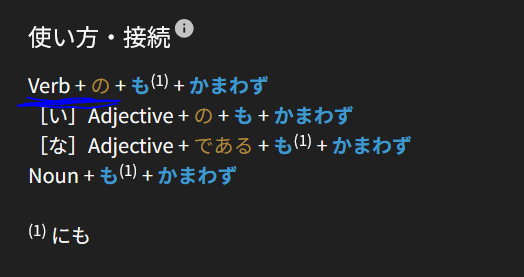without worrying about
Structure
- Verb + の + も + かまわず
- Noun + ( に ・ も ) + かまわず
- い-adjective + の + も + かまわず

without worrying about
Structure
- Verb + の + も + かまわず
- Noun + ( に ・ も ) + かまわず
- い-adjective + の + も + かまわず
What is the も doing here, out of curiosity? It looks like a requirement for the grammar point, but what is its function?
Also, is に totally and completely optional for verbs/nouns?
Hey 
Particle も is sometimes called inclusive topic particle. Basically it “adds” whatever you talk about to the topic. You can think of it as “also”.
Using Aも with negative expressions adds some emphasis, because that inclusive nuance implies other cases. If they do “not even” care about A (do not care about A too), then they don’t care about the implied cases too. Emphasizes that A is extraordinary.
For example, in Aも構わずB case, one usually cares about A.
他の人の視線もかまわず、彼女は裸でダンスをした。
She danced naked, not even minding people looked at her.
Also, is に totally and completely optional for verbs/nouns?
Yes, also も構わず is much more common than にも構わず
I hope it helps,
Cheers
Hmm. So to go off the example sentence, the も implies that she doesn’t care about not only people staring at her, but also, for example, people talking about her (dancing in the nude), people taking photos, etc.?
I would say that the 他の人の視線 is implied to be the most extreme example. I wouldn’t go to deep into it though, it’s best to think it implies other cases and is used for emphasis.
をものともせず is used when someone does something in the face of adverse circumstances.
“Even though there is a [noisy and annoying] siren, some people still pull through and fearlessly manage to make no ostensible effort to evacuate”… sounds a bit weird.
Just like @nekoyama says, it will sound strange.
“をものともせず” means to not give to difficulties or criticism, and is followed by action we can admire in those circumstances.
Examples:
けがをものともせず試合に出た
He went into the game despite his injury.
批判をものともせず自分の主張をつらぬいた
I stood up for myself despite criticism.
You can use " を意に介さず" instead, which simply means ‘not caring’ or ‘not worrying’.
サイレンを意に介さず、避難しようとしない人もいる。

Why was my answer wrong?
失敗した is a verb, and the grammar table says “Verb + の + も + かまわず”. The two accepted answers act like 失敗した is a noun.
Edit:
This time it at least asked me if I could use another particle instead of outright marking my answer wrong. How is 感じていた a noun???
Bumping this as I have the same ask. Even online I can find examples of “〜したのも構わず” but not without の unless it’s ”〜したにも構わず”. What am I missing?